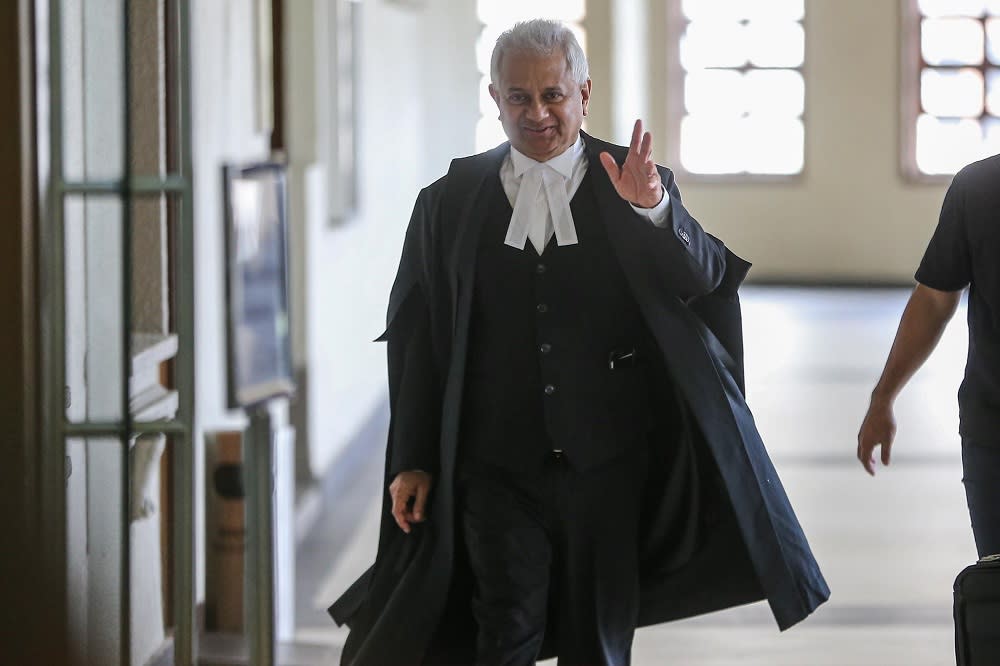Does Malaysia’s current health and economic crisis fulfil conditions for an emergency? Ex-AG Tommy Thomas says no

KUALA LUMPUR, Oct 24 ― Former attorney-general Tan Sri Tommy Thomas today waded into ongoing debate surrounding the possibility of a state of emergency being declared in Malaysia amid continuous silence from the federal government on the issue.
In a lengthy statement, the veteran lawyer noted the arguments put forth by some of the ministers and politicians from the ruling coalition and their interpretations of Article 150 of the Federal Constitution to support the proclamation of an emergency to tackle Malaysia’s worsening Covid-19 outbreak and the crippling effect on the national economy.
However, he claimed their arguments do not hold water.
“It is difficult to find a single rational argument to support a case that there is a ‘grave emergency’ today in Malaysia for whatever reason.
“Covid-19 has been with us since January. When it suits this government, it has boasted about how well they combated and contained the spread of Covid-19. And they have objective grounds to make this claim, having regard to the performance of other countries.
“Hence, on a relative and comparative scale, Malaysia has handled Covid-19 well. But the same government cannot then claim that overnight, Covid-19 has became so ‘threatening’ that we have a ‘grave emergency’. However, terrible Covid-19 is in Sabah, it does not warrant the declaration of a national emergency,” he wrote.
Thomas has largely refrained from making remarks publicly about the government after resigning as attorney-general in early March, but said he felt compelled to present his views on the legality of the emergency proposal this time around because of its far reaching consequences.
He pointed out that Malaysia as a constitutional monarchy requires even the King to abide by the law.
He explained that Article 150(1) laid down four situations for the proclamation of an emergency: a “grave emergency exists” or the country faces threats to its security, economic life, or public order.
“None of these terms are defined in the Constitution. Thus, they must be given their natural and ordinary meaning.
“Additionally, the draftsmen of the Constitution placed an important safeguard: it is not any emergency, but one that is ‘grave’. This distinguishes it from a crisis or an ‘ordinary’ emergency. It must be serious in nature, scale or magnitude,” Thomas said.
He said this means that the prime minister cannot automatically declare a state of emergency but must get the consent from the King, and emphasised that the King also has the right to consult the Conference of Rulers, or “anyone whose advice the Agong values”.
“It is impossible for the Prime Minister to argue that the security of Malaysia is in any way affected by whether he continues to remain in office. Likewise, public order. That leaves ‘economic life’,” Thomas said.
But he also said the last factor as a “precondition” has no application.
He said citing health is insufficient reason to declare a state of emergency.
“Nations have over centuries been affected by plague, tuberculosis, the Spanish flu and other contagious diseases. But they do not justify a national emergency,” he said.
He said the government can enforce more stringent health and sanitisation measures using existing laws to address health crises.
Thomas then said the real reason for the Perikatan Nasional government to resort to an emergency would be that it does not command the support of the majority in Parliament.
“Hence, the real reason is to ensure the survival of the Prime Minister in office.
“You reap what you sow. If you assumed power without being elected by the people of Malaysia, the same fate awaits you.
“You cannot stay in power by stopping others from apeing you. That sums up the so-called case for an emergency,” he added.
He said declaring an emergency just to stay in public office shows the prime minister is not acting for the public good.
“His private interests are in conflict with his public duty,” he added.
Reports have so far suggested that Putrajaya is seeking a dubious so-called state of “partial emergency”, also dubbed as “economic, health, or political emergency”.
It is unclear what the emergency powers being sought are at the moment as the breadth and scope under a state of emergency are far-ranging.
Several politicians from the ruling coalition had appeared to lean in favour of an emergency, without actually saying so.
Umno secretary-general Tan Sri Annuar Musa challenged government critics to come up with an alternative solution to the country’s soaring Covid-19 infections and receding economy.
International Trade and Industry Minister Datuk Seri Azmin Ali alluded to an “economic emergency” and taking “preemptive measures” in his statement this evening and accused the Opposition lawmakers who criticised the idea as provoking political instability by planting hatred against the government.
Related Articles Sabah CM attends burial of close aide who died from Covid-19 CMCO: Some workers abuse employers’ letters of consent, says police Annuar sanggah Ku Li, ‘darurat langkah berani, tegas’



